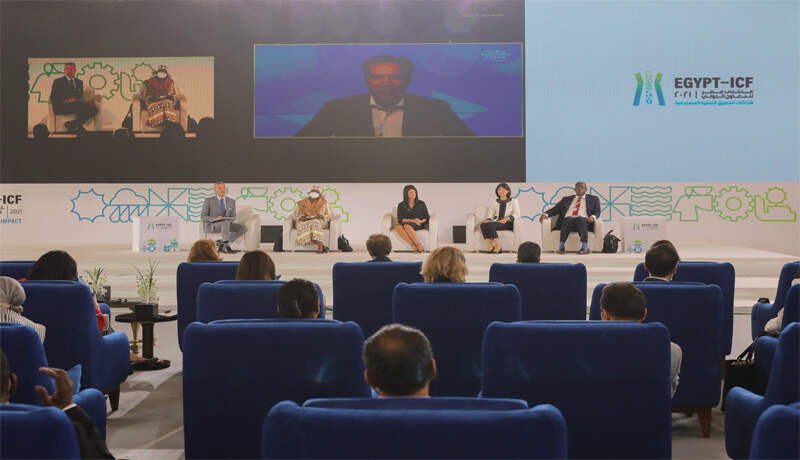
Global recovery from pandemic requires vaccine push in Africa, Egypt – says ICF. Egypt is well-positioned to become a regional hub for vaccine production, which can help Africa recover, says the African Development Bank senior official (AfDB), during the first edition of the Egypt – International Cooperation Forum (Egypt – ICF), launched by Egypt’s Ministry of International Cooperation in Cairo.
Solomon Quaynor, the AfDB’s Vice President for the Private Sector, Infrastructure, and Industrialization, said: “I am excited about its [Egypt’s] potential because Africa’s recovery has to be collective and united. A successful vaccination campaign could help realize the benefits of the African Continental Free Trade Area – a single market with 1.2 billion people and $3.4 trillion in gross domestic product.”
Speaking on the same panel entitled, “Multilateralism and International Cooperation Post-COVID-19”, H.E. Dr. Rania A. Al-Mashat, Egypt’s Minister of International Cooperation, said: “The COVID-19 pandemic has been a wake-up call for all of us, emphasizing how it is by working together that we can move forward and progressively for a brighter future.”
“The only way to accelerate sustainable development and the SDGs – a common denominator for all countries today – is through multi-stakeholder engagement and cooperation. By doing so, we can create more inclusive societies, greener and more resilient economies that work for everyone.”
Reviving cross-border collaboration, according to Quaynor, will ensure that Africa realises its social and economic potential and effectively reacts to a number of challenges, including climate change, gender equality, and extreme poverty.
According to the IMF, Egypt has provided a “bright spot” for economic prosperity as one of several emerging markets that experienced growth last year. BrgeBrende, President of the World Economic Forum (WEF), who joined the panel virtually, said Egypt has provided a “bright spot” for economic prosperity as one of several emerging markets that experienced growth last year.
Brende said: “The world needs more international and multilateral cooperation if we want to advance shared priorities of equality, resilience and sustainability. The challenges ahead of us are too complex and too connected for one government or industry to solve on its own.”
“As extreme poverty grows and investment in emerging markets declines, we need to pivot and make international organizations relevant and resilient to face the challenges of a post-COVID world and keep pace with the UN’s SDGs.”
Egypt’s economy is expected to increase by 3% in 2021, according to the International Monetary Fund (IMF), which is only achievable due to coordination between the public and private sectors.
For his part,H.E. Alamine Ousmane Mey, Minister of Economy, Planning and Regional Development of Cameroon, said: “Multilateralism and international cooperation has been extremely important in helping Africa manage COVID-19.”
“But we need to deal with connectivity and mobility as well as the delivery of vaccines on a continent-wide level. This is where greater collaboration is vital because it enables us to deal with multifaceted challenges in solidarity with one another. In this paradigm, leveraging the comparative advantage of different stakeholders is a priority to deliver on effective international cooperation in the post-COVID era.”
Keiko Miwa, Regional Director for Human Development at the World Bank, said: “The pandemic highlighted the importance and criticality of multilateralism. No country will be safe until every country is safe. This means a vaccine must be available to everyone.”
“Society’s interconnectedness makes the need for multilateral cooperation even greater. Now more than ever, there is a dire need for multi-stakeholder collaboration with an emphasis on the overarching goals of social and economic stability, shared prosperity and environmental sustainability.”
HonourableNetumbo Nandi-Ndaitwah, Deputy Prime Minister and Minister of International Relations and Cooperation of Namibia, said: “We strongly believe that multilateralism is the key to addressing global challenges and ensuring that citizens’ needs are met and sustainable development is achieved.
“The African Continental Free Trade Area is a major example of international cooperation between various governments, the private sector and civil society. This partnership has proven itself to be effective, and it has the potential to be a catalyst for Africa’s social and economic growth.”
The two-day hybrid event, which is being hosted by H.E. Abdel Fattah El-Sisi, President of the Arab Republic of Egypt, brings together the international development community to debate collective commitment to sustainable development as a stimulus for post-pandemic economic recovery.